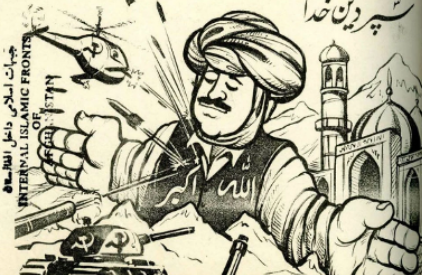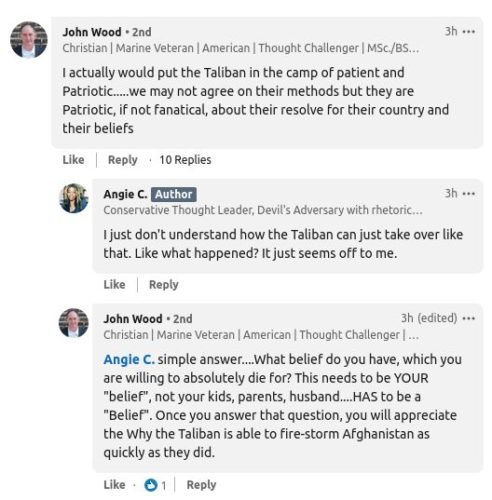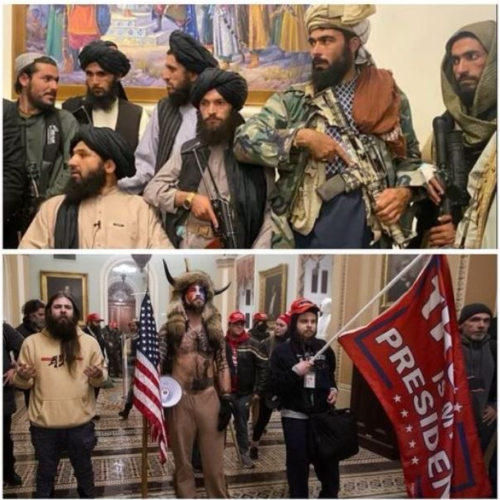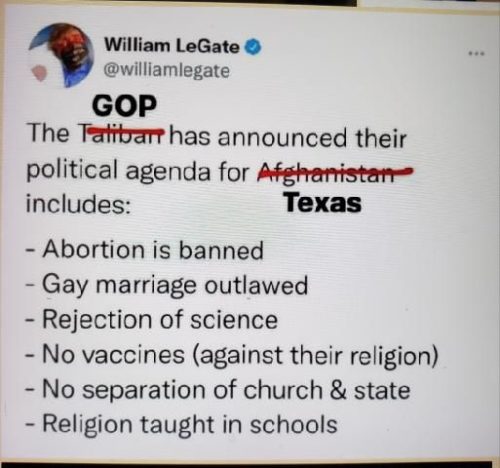In the 1980s under Ronald Reagan American military intelligence plastered Afghanistan with posters like the following one, promoting violent religious extremism as a form of invincibility.
That old propaganda campaign has come full circle now, as I see very similar thinking (obviously seeded by Russian military intelligence) being propagated by posters (pun intended) on LinkedIn.

Doesn’t that look a lot like a clumsily-worded explanation for the cartoon above?
Is this language being used by John Wood not also terrorism recruitment? It appears to be goading people into joining a “belief” system by promising a magic ability to violently and quickly overthrow their government.
Of course no such magic exists, this is disinformation. And of course that’s not even close to the truth about Afghanistan or why the Taliban were able to roll through territory so quickly.
Hint: they leveraged Twitter and motorcycles, a modern take on the Russian “speed, momentum and violence of action” doctrine (although it reminds me also of American “evolution of revolution” in the 1986 Toyota war and the Japanese on bicycles seizing Singapore rapidly in 1941).
Even more to the point I find it infuriating to see Americans try to blame the soldier who is unfed and unpaid, lacks fuel and ammunition, and faces the very real issue of his family being unprotected at home as the Taliban advance to kill them.
People sitting in their comfy chair banging on a social media comment box, spreading toxic and cheap narratives like “they should have fought harder” are a total disgrace to humanity — an insult to the nearly 70K who sacrificed everything fighting for their country.
If anyone wants to talk about serious issues related to soldier morale, it was a US President’s flimsy negotiations with the Taliban behind the back of an elected Afghan government that set the tone from the top as a clear act of bad faith.
Speaking of Twitter, here is a more clear-eyed take on what LinkedIn should be talking about:
If the Taliban returns to power, I along with other women…will either be stoned to death or executed in a public space in front of a crowd.
Women now are expected to lose everything.
If that sounds like a foreign policy issue, in reality this is just as much a domestic one for America. Can you tell which one is which?


Now might be a great time to remember that Ronald Reagan not only as President claimed the Mujaheddin (religious extremists who violently subjugated women) were “like our founding fathers”, he also repeatedly cited a man named Winthrop in his speeches about America.
Winthrop was a religious leader who subjugated women, calling them agents of the devil.
America finally switched sides in 1996 to fight against religious extremism in Afghanistan, which is also when the discussion started to bloom about rights of women in Afghanistan despite it being obviously late.
The Mujahedeen period (1992-1996) was marked by ferocious, internecine warfare that scarred all aspects of Afghan life. Women’s rights and freedoms were severely restricted. Grave human rights abuses included extra-judicial executions, torture, sexual violence, disappearances, displacement, forced marriage, trafficking and abduction. This period represents one of the darkest chapters in the history of Afghan women. The brutality and predatory nature of the civil war, or Mujahedeen period, contributed to the emergence of the Taliban and their consolidation of power throughout much of the country after their capture of Kabul, September 1996.
It’s kind of a recent thing, in other words, for the American government to officially care about ending the oppression of women and children. Slow and late, as the author Ghost Wars explained a long time ago:
…individuals inside the US bureaucracy, at the state department, elsewhere, who began to warn that the United States needed to change its political approach to this covert [support of Mujahedeen], that they needed now to start getting involved in the messy business of Afghan politics and to start to promote more centrist factions and to negotiate compromise with the Soviet-backed communist government in Kabul to prevent Islamist extremists from coming to power as the Soviets withdrew. These warnings, when you look at them with the benefit of hindsight, are quite prescient and certainly were strongly given, but they languished in the middle of the bureaucracy and were largely ignored by both second term Reagan administration and the first Bush administration…
In September 2007 the House of Representatives Committee on Foreign Affairs held a hearing where Chairman Lantos gave a retrospective and put it like this:
America should not be in the business of arming, training and funding both sides of a religious civil war in Iraq. Did the Administration learn nothing from our country’s actions in Afghanistan two decades ago, when by supporting Islamist militants against the Soviet Union, we helped pave the way for the rise of the Taliban?
When LinkedIn posted the above propaganda it seems they are rolling back time to a genuinely awful American ignorance and flirtation with tyranny, as well as exposing the tools of Russian military intelligence today.
Neither are ok, of course.
To be fair it is being said now that neither Russia nor China are pleased by Islamic extremism taking control of Afghanistan.
They fear that a revival of the harsh Islamist code and rule by intimidation that underpinned the fundamentalist group’s government in the 1990s would lead to a resurgence of Muslim extremists.
The emerging geopolitical quagmire doesn’t mean that Russia will pass up the opportunity to use anti-democratic religious recruitment propaganda of the Taliban to destabilize America.
It’s a shame to see LinkedIn facilitating the posters. If we were talking about WWII they would most certainly be censored. Or as an article in Business Insider recently put it:
“To counter Chinese and Russian IO, we need to be aware of the threat and educate the public,” the retired special-operations PSYOP soldier said. “Americans need to understand that this is a real, ongoing threat. Sometimes war doesn’t mean gunfire and explosions.”
Where are the grey hats?